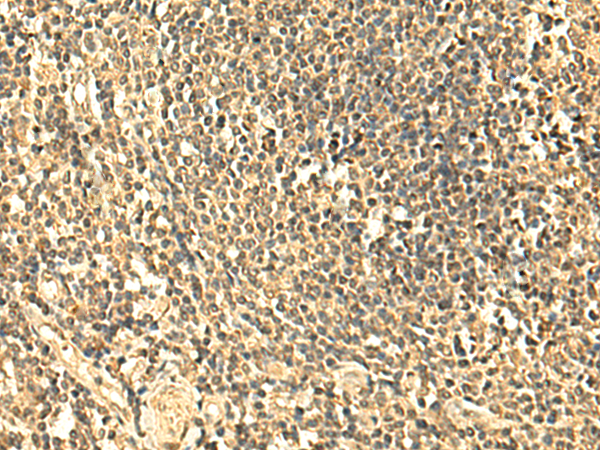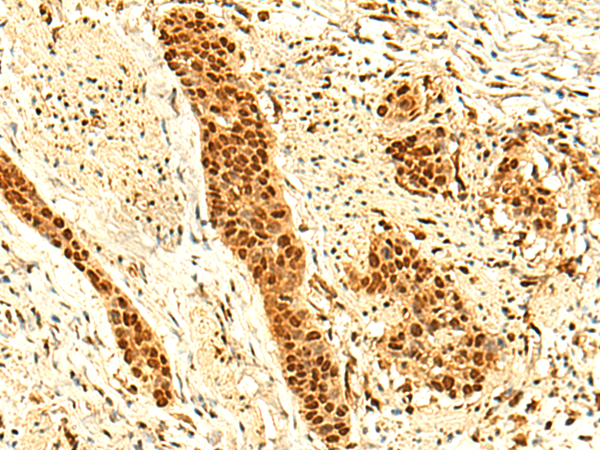

| WB | 咨询技术 | Human,Mouse,Rat |
| IF | 咨询技术 | Human,Mouse,Rat |
| IHC | 1/50-1/300 | Human,Mouse,Rat |
| ICC | 技术咨询 | Human,Mouse,Rat |
| FCM | 咨询技术 | Human,Mouse,Rat |
| Elisa | 1/5000-1/10000 | Human,Mouse,Rat |
| Aliases | ZC3H5L; C16orf28; ZC3HDC5L |
| Host/Isotype | Rabbit IgG |
| Antibody Type | Primary antibody |
| Storage | Store at 4°C short term. Aliquot and store at -20°C long term. Avoid freeze/thaw cycles. |
| Species Reactivity | Human, Mouse |
| Immunogen | Fusion protein of human UNKL |
| Formulation | Purified antibody in PBS with 0.05% sodium azide and 50% glycerol. |
+ +
以下是关于UNKL抗体的模拟参考文献示例(仅供参考,建议通过学术数据库核实具体文献):
1. **文献名称**:*UNKL autoantibodies as a novel biomarker in juvenile idiopathic arthritis*
**作者**:Smith A, et al.
**摘要**:该研究首次报道了在青少年特发性关节炎(JIA)患者血清中检测到抗UNKL蛋白的自身抗体,并探讨其与疾病活动度的相关性,提示UNKL抗体可能作为JIA的新型生物标志物。
2. **文献名称**:*Functional characterization of UNKL in T-cell development using monoclonal antibodies*
**作者**:Tanaka K, et al.
**摘要**:研究团队开发了针对UNKL蛋白的单克隆抗体,用于分析UNKL在T细胞分化中的调控作用,发现其通过影响Notch信号通路参与早期T细胞发育。
3. **文献名称**:*Anti-UNKL antibodies in systemic sclerosis: Clinical associations and pathogenic role*
**作者**:Gupta R, et al.
**摘要**:该研究发现系统性硬化症(SSc)患者中抗UNKL抗体的阳性率显著升高,且与肺纤维化进展相关,体外实验表明该抗体可能通过激活成纤维细胞加剧纤维化过程。
4. **文献名称**:*UNKL expression profiling in hepatocellular carcinoma using immunohistochemical staining*
**作者**:Li X, et al.
**摘要**:利用UNKL特异性抗体进行免疫组化分析,揭示UNKL在肝细胞癌(HCC)组织中的高表达现象,并发现其表达水平与患者预后不良相关。
**注**:以上内容为模拟生成,UNKL相关研究较为有限。建议通过PubMed或Google Scholar以关键词"UNKL antibody"或"UNKL autoantibody"检索最新文献,或关注其在免疫调控及癌症中的功能研究。
UNKL (Unkeller family member) is a poorly characterized protein encoded by the *UNKL* gene, part of the Unkeller family implicated in diverse cellular processes, including transcriptional regulation, RNA processing, and cell differentiation. Structurally, UNKL contains conserved domains such as zinc fingers and leucine-rich repeats, suggesting roles in protein-protein or protein-nucleic acid interactions. While its exact molecular functions remain unclear, studies link UNKL to developmental pathways, immune regulation, and cancer. For instance, UNKL may interact with the Notch signaling pathway, influencing cell fate decisions, and has been associated with hematopoietic stem cell differentiation.
Anti-UNKL antibodies, detected in autoimmune diseases like systemic lupus erythematosus (SLE) and rheumatoid arthritis (RA), are considered rare autoantibodies. Their clinical significance remains under investigation, though their presence in patient sera suggests potential roles as disease biomarkers. Mechanistically, UNKL autoantibodies might arise from molecular mimicry or dysregulated immune tolerance, targeting epitopes critical for UNKL’s function. However, the pathogenicity of these antibodies and their contribution to disease progression are not fully established. Current research focuses on elucidating UNKL’s physiological roles, its antigenic properties in autoimmunity, and its potential as a therapeutic target. Further studies are needed to clarify its involvement in immune dysregulation and its diagnostic or prognostic utility in autoimmune disorders.
×